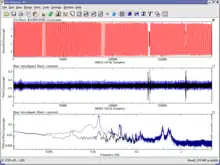kst (software)
Kst is a plotting and data viewing program. It is a general purpose plotting software program that evolved out of a need to visualize and analyze astronomical data, but has also found subsequent use in the real time display of graphical information. Kst is a KDE application and is freely available for anyone to download and use under the terms of the GPL. It is noted for being able to graph real-time data acquisition.
 Screenshot of Kst | |
| Original author(s) | Barth Netterfield[1] |
|---|---|
| Developer(s) | |
| Repository | github |
| Operating system |
|
| Type | Graph plotting software |
| License | GPL[1] |
| Website | kst-plot |
History
Kst was initially developed by Barth Netterfield, an astrophysicist as a personal project. By 2004 it had begun to be used in various universities and the European Space Agency and development was funded by the Canadian Space Agency.[1] Kst is written in C++ and based upon (but does not use) the Tk toolkit.[2] It is targeted towards large (million element) data sets.[3]
Features
kst is a fast real-time large-dataset plotting and viewing tool with basic data analysis functionality.[4][5][6]
Plot types
kst is able to plot histograms and 3-D with color and contour mapping for 3-D images.[7] It is also able to process Network Common Data Form (NETCDF) files for 2-d plotting[8]
Real-time plotting capability
Kst has been chosen where there is a need to present plots in real-time.[9]
Applications
Real-time applications vary in size from simple graphing of a sensor from a microcontroller such as arduino that may be set up by a hobbyist to a simple sensor[4] to plotting of real time date from the Atacama Cosmology Telescope.[10] The program has been recommended for real time graphical display of an open energy monitoring project.[11][12]
Inputs
Kst is able to accept a number input formats with Dirfiles being particularly suitable for streaming applications[10][13] and plug-in extension filters enabling other input stream types and file formats to be added.[7]
Scripting language
The tool offers a scripting language, termed KstScript based upon JavaScript syntax which can help automate workflows.[7]
Alternatives
Some alternatives include MATLAB, Qtiplot, SciDAVis, Grace and LabPlot.[6] However, some of these are part of a numerical analysis package.[6]
Spin-off developments
Dirfile format
In the process of developing the kst application a spin-off was the emergence of the Dirfile file format standard for time-ordered binary data in an efficient manner.[lower-alpha 1] It was developed under the Getdata project into an independent standard with its own API.[13]
See also
External links
Notes and references
Notes
- The records in files are timestamped and ordered in time of occurrence
References
- "Interview with Barth Netterfield about kst". TomChance.org. Archived from the original on 21 May 2004. Retrieved 28 April 2019.
- Zonca, Andrea (22 January 2009). "5. Combined quick look analysis". Advanced modelling and combined data analysis of Planck focal plane instruments (PhD). University of Milan. arXiv:1208.1950. hdl:2434/64581.
- "Canadian LFI Work". www.astro.ubc.ca. Archived from the original on 28 June 2017. Retrieved 14 November 2019.
- Reilly, Rob (August 2010). "Linux Journal" (PDF). No. 196. pp. 62−67. Real-Time Plots with kst and a microcontroller. Archived (PDF) from the original on 28 April 2019.
{{cite magazine}}: Cite magazine requires|magazine=(help) - Årzén, Karl-Erik; Faure, Pascal; Fohler, Gerhard; Mattavelli, Marco; Neundorf, Alexander; Romero, Vanessa; Schorr, Stefan (29 January 2011). "D1f - Interface Specification" (PDF). pp. 41–42. Appendix B - The Kst Real-Time Plotting and Data Viewing Interface. Archived (PDF) from the original on 15 April 2019.
- "Kst - Benchmarks". Archived from the original on 2 January 2014. Retrieved 2 January 2014.
- "The Kst Handbook" (PDF). Kst-plot. p. 1. What is Kst?. Archived (PDF) from the original on 26 April 2019. Retrieved 8 May 2019.
- "Software for Manipulating or Displaying NetCDF Data". www.unidata.ucar.edu. Archived from the original on 19 September 2019. Retrieved 14 November 2019.
- Nowak, Adam; Walkowiak, Przemysław; Szwabe, Andrzej; Misiorek, Pawel (2012). "wnPUT Testbed Experimentation Framework". Distributed Computing and Networking. Lecture notes in Computer Science. Vol. 7129. pp. 377, 379, 381. doi:10.1007/978-3-642-25959-3_27. ISBN 978-3-642-25958-6.
- Switzer, E. R.; Allen, C.; Amiri, M.; Appel, J. W.; Battistelli, E. S.; Burger, B.; Chervenak, J. A.; Dahlen, A. J.; Das, S.; Devlin, M. J.; Dicker, S. R.; Doriese, W. B.; Dünner, R.; Essinger-Hileman, T.; Gao, X.; Halpern, M.; Hasselfield, M.; Hilton, G. C.; Hincks, A. D.; Irwin, K. D.; Knotek, S.; Fisher, R. P.; Fowler, J. W.; Jarosik, N.; Kaul, M.; Klein, J.; Lau, J. M.; Limon, M.; Lupton, R. H.; et al. (1 August 2008). "Systems and control software for the Atacama Cosmology Telescope". Proceedings of SPIE. Advanced Software and Control for Astronomy II. 79019: 70192L. Bibcode:2008SPIE.7019E..2LS. doi:10.1117/12.790006. S2CID 12093498.
- "Learn | OpenEnergyMonitor". learn.openenergymonitor.org. Archived from the original on 27 May 2019. Retrieved 14 November 2019.
- "The OpenEnergyMonitor project [LWN.net]". lwn.net. Archived from the original on 27 May 2019. Retrieved 14 November 2019.
- "The Dirfile Standards". sourceforge.net. Archived from the original on 29 May 2018. Retrieved 29 April 2019.
